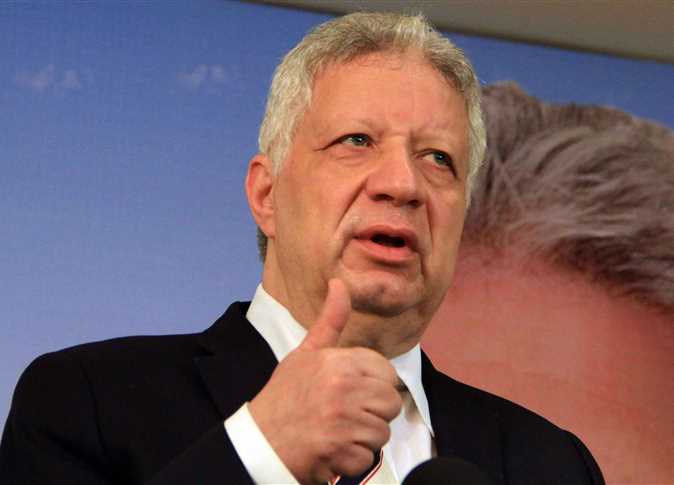Salafi preacher and former presidential hopeful Hazem Salah Abu Ismail has raised a flag and is calling on the masses to follow suit.
With his newly launched party, aptly dubbed Raya — Arabic for flag — Abu Ismail seeks to achieve the revolution’s now-elusive demands: bread, freedom and social justice.
In a jam-packed conference late last month in Sharqiya, Abu Ismail announced his party’s launch and reached out to Islamists and other groups to unite and, as he calls it, “raise the flag.”
In an impassioned speech, Abu Ismail said they were willing to protect the metaphorical flag with their lives, “even if there are martyrs below.”
Having tested the waters in the run-up to the presidential race, Abu Ismail has proven that his following is a force to be reckoned with. “We will now mobilize and form our ranks,” he said. “Our movement starts today and it will not stop until it achieves all of its goals.”
For Abu Ismail, mobilization is an easy feat. Thousands took to the streets to support him last year, when he was disqualified from the presidential election on claims that his mother held US citizenship, which he vehemently denied. The decision triggered clashes in Abbasseya, which resulted in the deaths of at least 10 protesters.
His supporters called themselves Hazemoun. They have come to play what is often seen as a controversial role in street politics at decisive moments ever since.
Aware of his support base, Abu Ismail said he was ready to launch a party more than eight months ago. Despite having 100 headquarters nationwide and an organizational structure in place, Abu Ismail chose to put the plans on hold.
“We waited on purpose, to give our ‘brothers’ a chance to excel and we would have followed them,” he said at the conference. “But now we are back to square one after Parliament was dissolved … and we won’t let the opportunity pass us by.”
Mohamed Morsy, a member of the party and longtime member of the “Hazem Current” — not to be confused with Egypt’s president of the same name — also boasts that the party was fully established, structured and ready to launch months ago. But it waited to give the ruling regime a chance to lead and reform the country.
An autonomous party
There is no shortage of political parties on the scene. But, confident of his following, and his distinctive ideology, Abu Ismail decided to carry his own flag.
Morsy says Raya is fundamentally different from other parties, which it sees as pandering to the US administration. “All political currents in the previous Parliament implemented US policies,” he says. “The US is stifling the country through bureaucratic and political systems, and we have to break free of these regulations.”
But while Raya likes to presents itself as a new experiment altogether, some see its inception as a reaction to mainstream political Islam.
Ashraf El-Sherif, a political science professor at the American University in Cairo, says that, in theory, Raya represents “revolutionary Salafis,” who seek to distance themselves from other mainstream Salafi groups.
However, practically speaking, he says, it is a group polarized from the Muslim Brotherhood, “to make parties like [the well established Salafi] Nour Party less popular. They are unorganized Salafi entities that are rebelling against the Salafi Dawah and its political arm the Nour Party,” Sherif adds, lumping Raya with the newly established Al-Watan Party, whose leaders are Nour defectors.
Indeed, Morsy rules out any coalitions with the three main Islamist parties — the Freedom and Justice Party, the Salafi Nour Party and the Construction and Development Party — since “their agendas are the reason we are where we are today.”
But while Raya is not looking to make friends with the Muslim Brotherhood and other main Salafi parties, it is equally uninterested in the main opposition bloc, the National Salvation Front. While they were against the draft constitution ratified in a referendum late last year, Morsy says they refrained from joining protests against it.
“The opposition’s means of expression made it difficult for us to join,” he says. “It was not peaceful and it aimed at burning down the country.”
Abu Ismail also believes “those who failed to destroy the country through violence and Molotov cocktails are spreading rumors about its economy,” he said in Sharqiya. “It brought us to a point where the people who were chanting against the Supreme Council of the Armed Forces (SCAF) are now calling for its return,” he says. “Are we that gullible?”
During the period when SCAF was ruling the country, Abu Ismail was an outspoken critic of military rule, garnering him yet more support.
Identity and rights
The party’s objective is straightforward: work toward providing bread, freedom and social justice through a legislative agenda and bundle of laws that aim to repair Egypt’s political landscape and economy.
But a Salafi party’s bundle of laws sounds intimidating to many, since the group has long called for a strict implementation of Sharia. Attempting to allay concerns, Morsy says the party believes there is no disagreement among the general public over the notion of Sharia, adding the dispute exists only in media coverage.
“We believe the minimum [definition of Sharia] that is agreed upon among all factions, whether Islamist or liberal, is the core that should be applied in the concept of Sharia,” he explains.
“If you write down your understanding of Sharia right now, I am willing to sign on it,” he says, adding that the conflict is not one of ideologies, but of a revolution and a counter-revolution that aims to vilify elected bodies. He says “there is no such thing as a religious state,” and that Egypt has always been a civil state.
Morsy says members of Hazem’s Current study their decisions carefully and conduct significant research, especially on Western democracies. “We’re not just a group of sheikhs sitting around saying God and his Prophet said …” says Morsy.
As for the difference between Egypt and Western states, he says, the latter are based on absolute freedom. “I am the most liberal, but not in contrary to God’s laws. I am the most secular, but not in contrary to God’s laws,” he says.
Raya seeks to establish a modern civil Islamic state that carries all these meanings, he says, and any contradiction between them is one created solely by the media. Morsy says the party will steer clear of debatable religious issues and only discuss things that are agreed upon. “If you close down a gambling casino for example, I don’t think people would object,” he says.
But while some in Egypt would indeed object to a move like this, Morsy insists Sharia stipulates that nobody impose their beliefs.
“All I can do is provide a suitable environment for it to be applied,” he says, a statement Abu Ismail himself often repeats, without explaining how this would be created.
Morsy agrees there is a thin line between restricting freedoms and “providing a suitable environment. Do you want absolute freedom, or one that is bound by traditions?” he asks. “Because our traditions are the same — if a girl is dressed provocatively, she will be criticized anywhere.”
Uttering such a subjective statement with almost absolute confidence would arguably spur the anger of a sizeable segment of Egyptian society, however, let alone any attempts to actually create an environment for it.
At the end of the day, Morsy says, it is the legislature that will decide whether any laws pass and that, ultimately, the majority will rule. He explains that any draft law would be referred to the relevant institution and that religious issues would ultimately be up to Al-Azhar to decide on.
Popular support?
Morsy says there are thousands working for the party voluntarily until the doors open for membership — on hold until party leaders prepare a list of parliamentary candidates.
When the time comes, membership will be open for everyone, Morsy says. He claims there is already a large number of Copts and women working in the party. According to him, out of 160,000 signatures Abu Ismail secured before the presidential race, 30,000 were from Copts. But it is quality, not quantity, that Raya seeks. “I’d rather have 10 members who are on the right path than 1,000 people who don’t know where they’re going,” Morsy says.
Addressing a crowd of eager listeners, Abu Ismail said he was not looking for “supporters or fans,” but rather for “active committees to work on the ground and talk to people and raise awareness.”
Abu Ismail encouraged youth participation and called on attendees to vote for candidates aged between 25 and 35. “When [former President Hosni] Mubarak was ousted, young people were happy even though they haven’t lived under his oppression for as long as us,” he said. “But they felt they finally had a role and made decisions that had consequences.
“They realized they were decision makers and actually belonged in this country,” he added, lamenting the loss of this feeling in the current political climate. Through Raya, Abu Ismail vowed to restore that feeling and give young people room to exercise their roles as decision makers.
Confidence in their base of support here, Raya was eyeing 100 percent of the seats in Parliament and planned on enlisting young members for at least 50 percent of its candidates. A court decision to suspend the upcoming parliamentary elections, however, has delayed these plans.
But Sherif downplayed Abu Ismail’s support base, saying it was only the case during the presidential elections, distinguishing it from a parliamentary race.
“Abu Ismail is very popular as an individual but you cannot say the same for his party,” Sherif explains, “I don’t think he will do very well in parliamentary elections.”
For Sherif and others, the fact that the party revolves around one figure is no guarantee for a large base of support that translates into electoral gains.
And Abu Ismail is indeed a raison d’être for the party.
“[Abu Ismail] has this common phrase. He says, ‘I will raise the flag and whoever wishes can follow me,’” Morsy says. “Now we need more people to raise the flag.”
This piece was originally published in Egypt Independent's weekly print edition.




